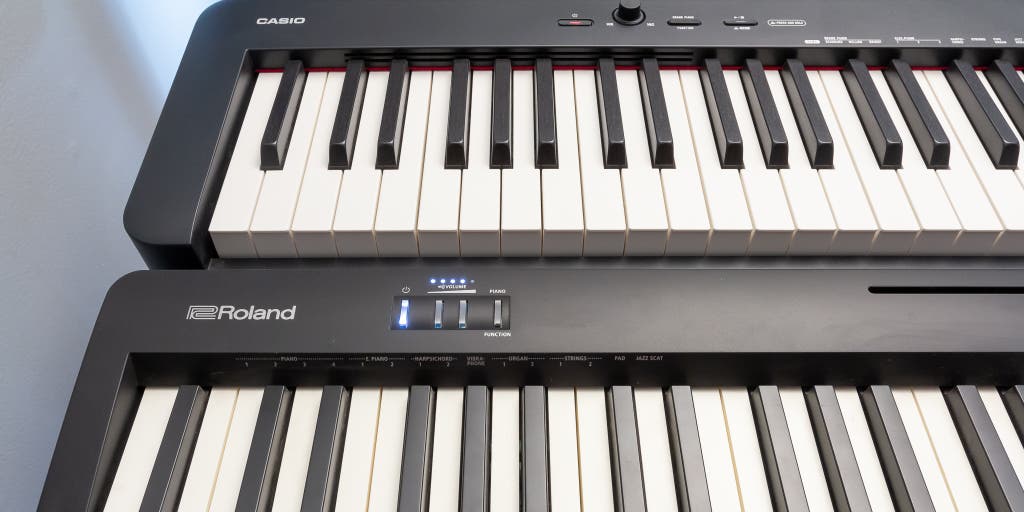1. Introduction
When it comes to choosing a musical instrument, there are many different options out there. One of the most popular choices is between a keyboard and a digital piano. Both instruments offer a range of features and capabilities, but each has its own unique characteristics that make them ideal for different types of players. In this article, we will explore the differences between keyboards and digital pianos to help you decide which one is right for you.
2. What is a Keyboard?
A keyboard is an electronic musical instrument that can be used to produce sounds and melodies. It typically consists of black and white keys arranged in a rectangular shape, similar to a piano keyboard. Keyboards come in a variety of sizes, from small, portable models to larger, full-sized versions with additional features such as synthesizers and drum machines. They are often used by musicians in recording studios, live performances, or for composing music.
3. What is a Digital Piano?
A digital piano is an electronic musical instrument that is designed to simulate the sound and feel of an acoustic piano. Digital pianos usually feature weighted keys that mimic the action of an acoustic piano, as well as built-in speakers for amplification. They are often used by beginners or those who don’t have access to an acoustic piano due to space or budget constraints.
4. Difference in Sound Quality
The main difference between keyboards and digital pianos lies in their sound quality. Keyboards typically produce sounds that are more synthetic than those produced by digital pianos, which are designed to replicate the sound of an acoustic piano as closely as possible. Digital pianos also have built-in speakers which provide better sound quality than most keyboards can offer.
5. Difference in Key Action and Weighted Keys
Another difference between keyboards and digital pianos is how they feel when playing them. Keyboards typically have lighter key actions, meaning that they require less force when pressing down on the keys than digital pianos do. Digital pianos usually feature weighted keys which provide a more realistic playing experience by simulating the feel of an acoustic piano’s keys.
6. Difference in Polyphony
Polyphony refers to the number of notes that can be played simultaneously on an instrument. Keyboards typically have higher polyphony than digital pianos due to their ability to layer multiple sounds together at once. Digital pianos usually have lower polyphony since they are designed to replicate the sound of an acoustic piano more accurately rather than create complex layered sounds like keyboards can do.
7. Difference in Connectivity Options
Keyboards often come with a range of connectivity options such as MIDI ports, USB ports, audio outputs, and even Bluetooth connectivity for wireless control over other devices or software programs. Digital pianos typically only have MIDI ports for connecting with other instruments or computers but may also include audio outputs for connecting with amplifiers or PA systems if needed.
8. Difference in Price Range
The price range for both keyboards and digital pianos varies greatly depending on the features offered by each model and brand. Generally speaking, keyboards tend to be cheaper than digital pianos due to their simpler design and fewer features compared to their more expensive counterparts. However, there are some mid-range keyboards that offer excellent value for money if you’re looking for something more affordable but still high quality.
9 Pros and Cons of Each Instrument
Keyboards:
Pros:
• Lightweight & Portable
• Wide Range Of Sounds & Effects
• Affordable
• Easy To Use & Setup
Cons:
• Lower Quality Sound Than Digital Pianos
• Lighter Key Action Not Suitable For Advanced Playing Techniques
Digital Pianos:
Pros:
• Realistic Sound & Feel Of An Acoustic Piano
• Weighted Keys Provide Better Control Over Dynamics & Expression
• More Connectivity Options For Expanding Your Setup
Cons:
• More Expensive Than Keyboards
• Heavier & Less Portable Than Keyboards
10 Conclusion
In conclusion, both keyboards and digital pianos offer great features and capabilities that make them attractive options for different types of musicians depending on their needs and preferences. While keyboards tend to be cheaper and more lightweight than digital pianos, they lack the realistic sound quality and key action found on many digital models which makes them better suited for experienced players looking for an authentic playing experience without breaking the bank. Ultimately it comes down to personal preference – so take your time researching each option before making your decision!< h2 > 11 FAQs

